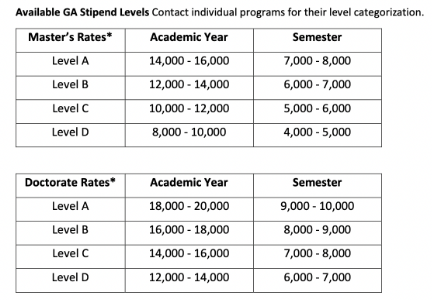Stipends become hot topic amongst graduate students
March 16, 2023
In the Fall of 2022, BGSU’s Graduate Student Senate (GSS) conducted a survey to gauge student concerns and found out of 450 respondents, 70% said graduate student stipends were a primary concern.
Stipends are given to graduate assistants (GAs) and are often accompanied by tuition coverage. GA positions include research assistants, teaching assistants, teaching associates and housing associates.
There are four stipend levels for both master’s and doctorate GA positions. The pay level varies between departments, depending on budgeting priorities and restrictions.

GSS President Amanda Taylor is working alongside GSS Vice President Nick Malendowski and advisor Dr. Jennifer Waldron, Vice Provost and Dean of the Graduate College, to address student concerns of being underpaid.
“We know from doing the survey at the beginning of the year that graduate student stipends are too low. We know this, Nick and I, because we’ve lived this experience,” Taylor said. “It is a big deal, it is on the forefront of everyone’s mind. This was the number one issue that grad students wanted to see GSS address.”
Emrys Rhodes is a graduate student instructor getting his Ph.D in philosophy. He has a second job to cover costs, despite warnings that the workload could infringe on his teaching obligations.
Since only tuition is covered by stipend, Rhodes was left paying $1,100 to $1,200 per semester out of pocket.
“There’s a point where they are paying so badly that you might as well be working at the coffee shop, and at least that job has fixed hours and you get to go home and be done afterward,” Rhodes said.
Rhodes takes pride in the quality of his teaching and treats it as a priority. But he fears that delivering a higher quality of education than what he is paid for is unfair.
“Teaching is actually one of my favorite parts of the job,” he said. “I want to give my students the best class that I can. I think I am teaching something interesting and important,” Rhodes said. “I don’t want to provide something that is worth more than I’m being paid.”
Rhodes said that a lot of departments “live and die” by how many students major in their area, a statistic that is heavily influenced by the work of graduate assistants.
“A lot of times, the first point of contact that a student has with a particular field of study is in an intro-level course,” Rhodes said. “We do a lot to keep our major numbers high.”
Taylor and Malendowski are “fighting for equity” by advocating for an equitable percentage raise in student stipends throughout each bracket, in order to make payment more equal across the board.
Dr. Waldron thinks of herself as a collaborator in her role as the GSS advisor and BGSU administrator, advocating the importance of graduate student needs. However, she has to do it “within the context of a university structure.”
“My job is to navigate those different pieces. How do we hear what the graduate students are saying, and how do we take those next steps so we can make some progress?” she asked.
There are a number of obstacles to achieving higher stipends.
“Universities are underfunded as a whole. There’s only so much money that universities are given and it’s a large group of people that the money has to be split between. The biggest issue in itself is how to allocate the money to meet everyone’s needs,” Malendowski said.
Every year, the Board of Trustees approves a budget 18 months in advance of the academic term, based on “BGSU priorities and strategic planning,” according to Waldron. Money is allocated to the graduate college, which distributes designated amounts to the different colleges. The colleges then give money accordingly to each department which leaves little flexibility in the budget.
“We are all finding it really challenging to figure out a long-term solution,” Waldron said.
However, Waldron is working with GSS to analyze other universities’ stipend situations and potentially find ways to extend the budget.
“We’ve put together data from some peer institutions and got a sense of where we stack up. And being able to kind of propose some ways that we can creatively [problem solve],” Waldron said.
GSS and Dr. Waldron are passionate about making graduate students feel valued through the initiative.
“My message would be that they are vital, and many people on campus know that. And we have to do a better job of making them feel valued because they are,” Waldron said.













